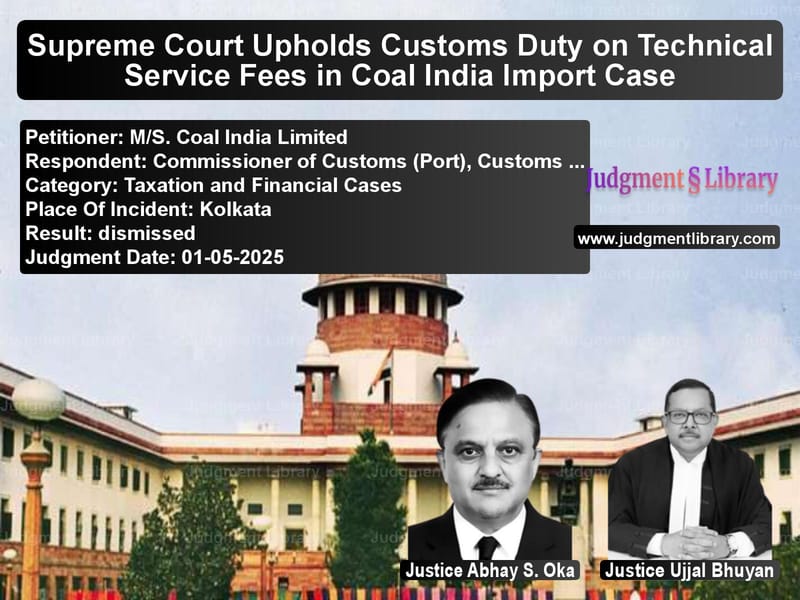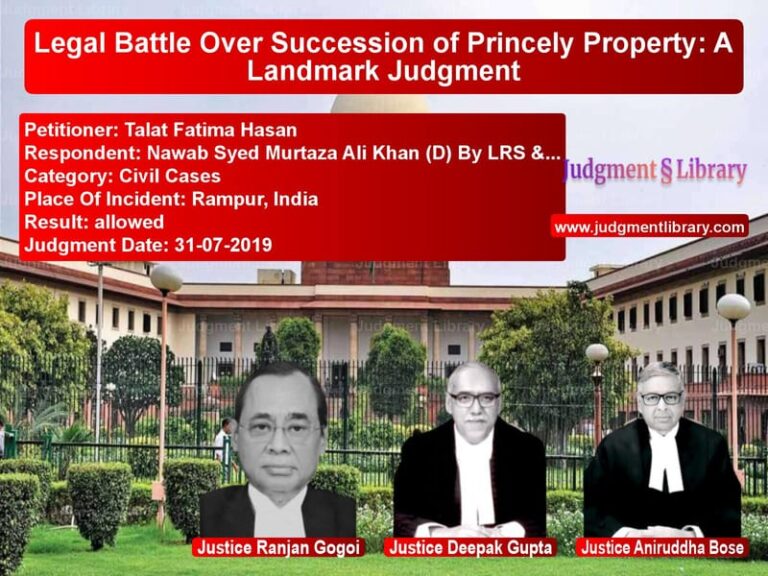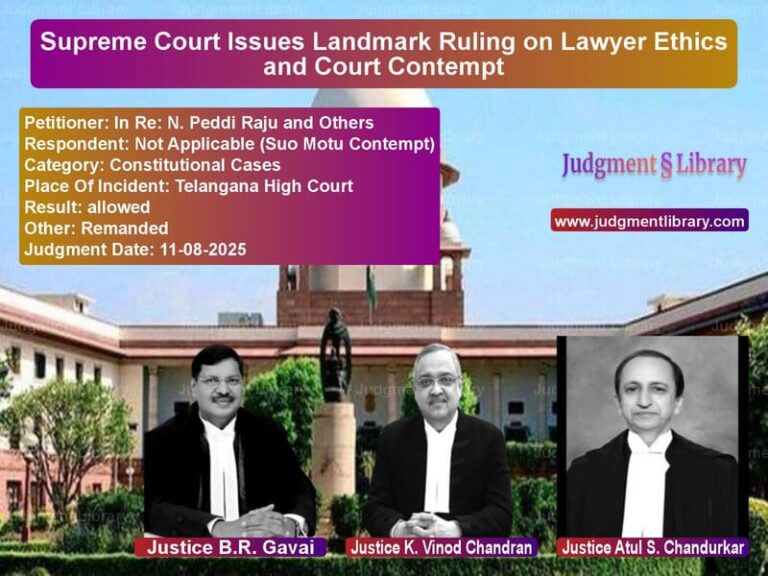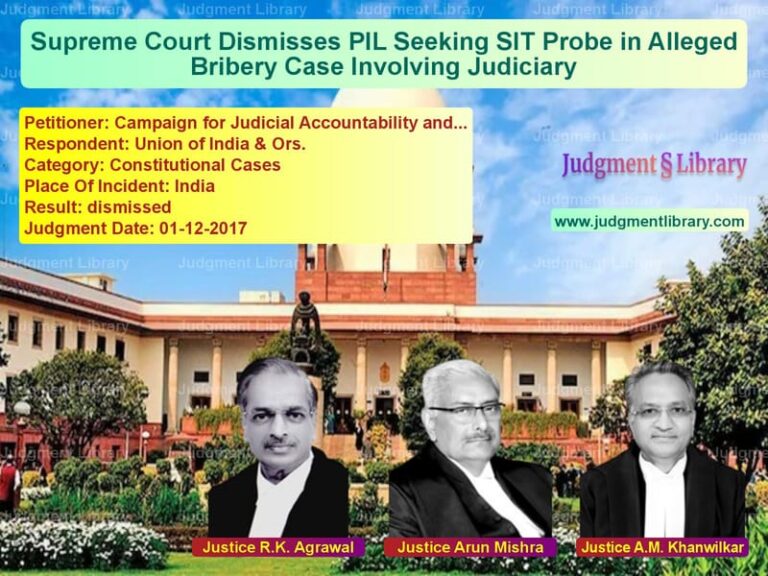Supreme Court Upholds Customs Duty on Technical Service Fees in Coal India Import Case
In a significant ruling on customs valuation, the Supreme Court of India has dismissed Coal India Limited’s appeal and upheld the inclusion of engineering and technical service fees in the assessable value of imported goods. The case, which traveled through multiple levels of customs authorities over several years, centered around whether payments made to a local agent for pre-importation services should be considered part of the transaction value for calculating customs duty. The Court’s decision reinforces the principle that payments made as a condition of sale, even to third parties, must be included in the customs valuation of imported goods.
The dispute began when Coal India Limited, through its subsidiary Central Coalfields Limited, imported spare parts for P&H Shovels from M/s Harnischfeger Corporation, USA. The foreign supplier had stipulated through its distributor M/s Voltas Limited that in addition to the Free on Board (FOB) value, the appellant had to pay “an additional eight (8) percent of the total FOB amount on a pro-rata against each shipment to our Indian distributor M/s. Voltas Ltd., Calcutta in Indian rupees.” The foreign supplier explicitly clarified that “this payment is to be made to Voltas and is not to be deducted from the FOB amount payable to us against the Letter of Credit.”
The Legal Battle Through Customs Authorities
The Assistant Commissioner of Customs, while finalizing the provisional assessment of bills of entry, held that these engineering and technical service fees were includable in the assessable value under Rule 9(1)(a) and Rule 9(1)(e) of the Customs Valuation Rules, 1988. This resulted in a short levy of customs duty amounting to Rs. 64,47,244.00. The authority observed that “Voltas Limited was the local agent of the foreign supplier” and that “the product support services i.e. engineering and technical services provided by M/s Voltas Limited were primarily related to the type and quantum of spare parts required to be supplied by the foreign supplier.”
When Coal India appealed this decision, the Commissioner of Customs (Appeals) confirmed the original order, stating that “in the present case, payment of engineering & technical service charges constituted an integral/inseparable condition of sale of imported goods. Since the payment of service charges to M/s Voltas was dictated by the condition of sale to satisfy the obligation of the seller/foreign supplier, the inclusion of the said charges in the assessable value by the lower authority under the provisions of Rule 9(1)(e) clearly prescribes for inclusion of all other payments actually made or to be made as a condition of sale of the imported goods.”
The matter then reached the Customs, Excise and Service Tax Appellate Tribunal (CESTAT), which delivered a comprehensive analysis of the relationship between the parties. CESTAT held that “the documents such as purchase order of the appellant, the quotation by the American supplier and documents of M/s Voltas Ltd. relied upon clearly referred M/s Harnischfeger Corporation as the principal and M/s Voltas Ltd. as the agent or distributor. We have not been shown any agreement between M/s Voltas Ltd. and the appellant. The services undertaken by M/s Voltas Ltd., apparently, are only at the instance of the US based supplier as the appellant has no choice in importing the spares without availing the services of Voltas Ltd., who is the agent of the American based supplier.”
Arguments Before the Supreme Court
Before the Supreme Court, the learned counsel for Coal India Limited made several key arguments. He contended that “engineering and technical service charges paid by the appellant to M/s Voltas Limited could not be included in the assessable value of the imported goods (spare parts).” He argued that “the view taken by CESTAT that the present case is covered by Rule 9(1)(a) and Rule 9(1)(e) of the Customs Valuation Rules is contradictory. Provision of Rule 9(1)(e) of the Customs Valuation Rules can be invoked only when the payment is not covered by clauses (a) to (d) of Rule 9.”
The appellant’s counsel also referred to the Note to Rule 4 of the Customs Valuation Rules, submitting that “it clearly says that value of imported goods shall not include charges for maintenance or technical assistance undertaken after importation of imported goods.” He emphasized that “M/s Voltas Limited was an agent of the foreign supplier. It had rendered maintenance and engineering services to the appellant and its subsidiaries. Such services rendered by it had no direct nexus to the value of the goods imported. Stipulation of 8 percent of FOB payable to M/s Voltas Limited was only for the services rendered by it. There is no direct nexus of the said payment with the goods imported.”
On the other side, the learned counsel for the respondent supported the impugned order of CESTAT. He pointed to the purchase order and submitted that “payment made to the Indian agent was clearly part of the FOB amount payable to the foreign supplier.” He also referred to the documents titled as Voltas Limited Terms and Conditions, submitting that “it was clearly mentioned therein that prices quoted were exclusive of its engineering and technical service fees. Payment of 8 percent of the FOB price to the Indian agent was a condition of sale of the imported goods. Such payment was made purely as a condition of sale of the imported goods.”
The respondent’s counsel further argued that “various services provided by M/s Voltas Limited were on behalf of the foreign supplier as its agent. The services rendered were to identify the requirement of the spares to be imported and therefore the payments so made had a direct nexus to the imported goods. As the local agent, services provided by M/s Voltas Limited were pre-importation activities and aimed at making the sale of spares by the foreign supplier effective.”
The Supreme Court’s Analysis and Reasoning
The Supreme Court began its analysis by examining the relevant provisions of the Customs Act and the Customs Valuation Rules. The Court noted that Section 14(1)(a) of the Customs Act provides that “the value of such goods shall be deemed to be the price at which such or like goods are ordinarily sold or offered for sale, for delivery at the time or place of importation or exportation, as the case may be, in the course of international trade where the seller or buyer had no interest in the business of each other or one had no interest in the business of the other.”
The Court particularly focused on Rule 9 of the Customs Valuation Rules, which deals with costs and services to be added to the transaction value. Rule 9(1)(e) specifically includes “all other payments actually made or to be made as a condition of sale of the imported goods, by the buyer to the seller, or by the buyer to a third party to satisfy an obligation of the seller to the extent that such payments are not included in the price actually paid or payable.”
The Court also considered the Note to Rule 4, which states that “the value of imported goods shall not include the following charges or costs, provided that they are distinguished from the price actually paid or payable for the imported goods: (a) Charges for construction, erection, assembly, maintenance or technical assistance, undertaken after importation on imported goods such as industrial plant, machinery or equipment.”
In applying these legal principles to the facts of the case, the Supreme Court referred to its earlier decision in J.K. Corporation Limited, where it had held that “the basic principle of levy of customs duty, in view of the aforementioned provisions, is that the value of the imported goods has to be determined at the time and place of importation. The value to be determined for the imported goods would be the payment required to be made as a condition of sale. Assessment of customs duty must have a direct nexus with the value of goods which was payable at the time of importation. If any amount is to be paid after the importation of the goods is complete, inter alia, by way of transfer of licence or technical know-how for the purpose of setting up of a plant from the machinery imported or running thereof, the same would not be computed for the said purpose. Any amount paid for post-importation service or activity, would not, therefore, come within the purview of determination of assessable value of the imported goods so as to enable the authorities to levy customs duty or otherwise.”
The Court also cited its decision in Ferodo India (P) Ltd., which explained that “under Section 14 of the Customs Act, 1962, the assessable value of imported goods is deemed to be the price at which such or like goods are ordinarily sold or offered for sale for delivery at the time and place of importation or exportation, as the case may be, in the course of international trade, where the seller and the buyer have no interest in the business of each other and the price is the sole consideration for the sale or offer of sale.”
The Court’s Final Conclusion
After thorough consideration of all aspects, the Supreme Court concluded that “the services rendered by the Indian agent were not post-importation activities. The services provided were directly relatable to the import of the goods by way of product support service which is covered by Sections 14(1) and 14(1A) of the Customs Act read with Rule 9(1)(e) of the Customs Valuation Rules.”
The Court emphasized that “thus on thorough consideration of all aspects of the matter, we are of the considered opinion that the view taken by all the lower authorities is correct and no interference is warranted. There is no merit in the appeal.”
This judgment reinforces the principle that payments made to third parties as a condition of sale must be included in the customs valuation, even if they are characterized as service fees. The decision provides important guidance for importers and customs authorities on the treatment of various types of payments in international transactions and underscores the importance of examining the substance of transactions rather than their form when determining customs duty liability.
Petitioner Name: M/S. Coal India Limited.Respondent Name: Commissioner of Customs (Port), Customs House, Kolkata.Judgment By: Justice Abhay S. Oka, Justice Ujjal Bhuyan.Place Of Incident: Kolkata.Judgment Date: 01-05-2025.Result: dismissed.
Don’t miss out on the full details! Download the complete judgment in PDF format below and gain valuable insights instantly!
Download Judgment: ms.-coal-india-limi-vs-commissioner-of-cust-supreme-court-of-india-judgment-dated-01-05-2025.pdf
Directly Download Judgment: Directly download this Judgment
See all petitions in Customs and Excise
See all petitions in Judgment by Abhay S. Oka
See all petitions in Judgment by Ujjal Bhuyan
See all petitions in dismissed
See all petitions in supreme court of India judgments May 2025
See all petitions in 2025 judgments
See all posts in Taxation and Financial Cases Category
See all allowed petitions in Taxation and Financial Cases Category
See all Dismissed petitions in Taxation and Financial Cases Category
See all partially allowed petitions in Taxation and Financial Cases Category







